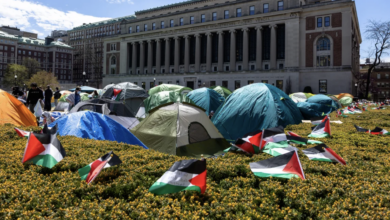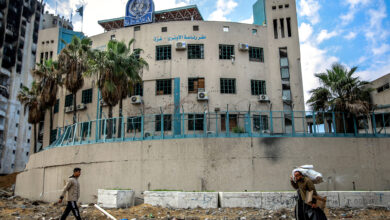Rafah – A few months ago, it was a construction site busy with cranes and drills, 80 meters from the Gaza-Egypt border. Now the site of the underground wall originally built in the border town of Rafah to obstruct smuggling activities is no more than a patch of sandy ground. Whether or not a completed wall lies underneath, locals say, is largely irrelevant: Underground smuggling will continue.
In April, Israeli media reported that the Egyptian authorities had halted construction of the wall after the fall of former President Hosni Mubarak. However, there has been a lack of information from the Egyptian government as to whether work was halted, or indeed whether the project has been completed.
The initial plan was to build a wall with overlapping steel panels held together with molded steel connections. According to locals, the wall extends along 10 kilometers of the border strip and is from 20 to 30 meters deep.
“The steel in use is not hard enough to prevent smuggling,” said Hamed Rady, a contractor who is in charge of building the 14 surveillance towers along the border, but did not contribute to the construction of the wall. “Smugglers have managed to cut through it using electric guns.” Trucks carrying steel sheets for the wall were often visible driving through the town of Rafah months ago.
According to Rady, the iron was imported from a Romanian supplier via Alexandria. Trucks spotted by Al-Masry Al-Youm carrying the metal plates throughout last year had Alexandria license plates. However, little is known about the nature of the iron plates supplied for the wall’s construction.
A smuggler, who requested anonymity, said that there have been successful attempts to dig holes in the wall using combustible substances, including oxygen. He added that the insertion of the metal plates stopped where the wall ran through a residential area, and that this section boasted many tunnels.
“The armed forces are making all efforts to stop smuggling,” Abdel Wahab Mabrouk, the governor of North Sinai, told Al-Masry Al-Youm in a recent interview. “These efforts will now intensify following the reconciliation between Hamas and Fatah.”
A reconciliation deal between rival Palestinian factions Fatah and Hamas was brokered in April after months of mediation that started with the failure of the unity government in 2007.
Locals believe that such reconciliation will translate into a clampdown on smuggling activities, long an important source of arms for Hamas. Throughout 2010, Hamas publicly denounced Egypt’s wall construction project, while Fatah blessed the move as a legitimate attempt at protecting Egypt’s national security.
In addition to the underground wall, Egypt has also established a tunnel detection system with financial support from the US government. A US Embassy cable dated December 2009, leaked through the whistleblower website WikiLeaks, indicates that the wall, funded by the Egyptian government, and the tunnel detection system, funded by the US government, are both efforts at reducing smuggling, though their failure to do so points to the difficulty of the task.
“While achieving short-term success, those efforts have also clearly demonstrated long-term challenges to Egypt's capacity to combat arms smuggling. Recent damage to some of the equipment related to the tunnel detection system appears to have been intentionally inflicted, although it is unclear by whom,” says the document.
According to the cable, the steel wall on the Egyptian-Gaza border is valued at US$40 million and was due to be completed in December 2010.
Another cable, dated February 2010, says that local tribesmen in Sinai told US Embassy officials that the wall could create tensions in the peninsula. The wall “will increase tensions on both sides of the border and could lead to violence in North Sinai as displaced smugglers look for other ways to make money,” a community leader was quoted as telling a US diplomat in the cable.
Currently, smuggling continues to take place across the border, according to local smugglers, who said that the security void that followed the Egyptian uprising has given them more freedom to pursue their underground work.




